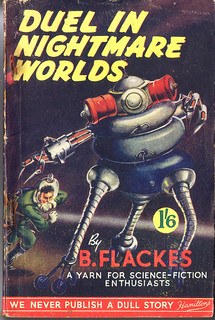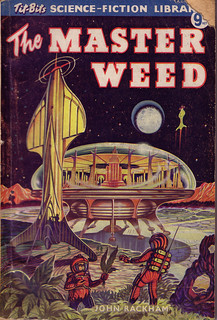I love books. Tatty old paperbacks especially. Sometimes I buy them because I like the author, sometimes because they're 'I have always meant to get round to reading it' books, but, to be honest, I mainly but them for the lurid covers. I mean, who wouldn't be happy knowing that their bookshelves contain masterpieces of art like these:
Most of my collection of mouldering pulps are Science Fiction (or what passed for it in the good old days, ferinstance: these days no publisher (in their right minds) would read beyond page three of the manuscript of The Master Weed which details the thrilling adventures of a Captain Video-like space-ranger and
his identical, remote-controllable simulacrum robot. In the book they thwart
the evil plans of a mad scientist whose dastardly scheme to take over
the planet Mars hinges upon everyone on the planet simultaneously
smoking drugged cigarettes. So cunning is his plan that they all do just
that! He would have got away with his cunning plot too, if it hadn't been for our
meddling hero who turned up at the fateful smoke-in event as a robot and therefore immune to the doped ciggies. Even then he had to
pretend to be drugged until he could rescue the token semi-naked space
bimbo which he did by skewering the villain to a control panel with a
casually discarded screwdriver and then electrocuting her head.
Only in the last few years have I come to appreciate the joys of crappy books' cover art from other genres. Here are a couple of recent buys I really like:
I have even started looking at the 'romance' racks at the local charity shops and discovered gems like:
I love the cover of this one but the book is brilliant: a laugh-out-loud, tosh, Gothic romance, reworking of Jane Eyre set in contemporary America - in which a plain English girl becomes heir to a vast American fortune. She flies over to find a transported Irish castle, atop a 'mile high' mountain, owned by the mysteriously Byronic Benjamin Hollister, a tortured musical genius with 'long tapering fingers' and a secret, hidden in the locked tower (not a former wife, but mad cousin Gwenyth who is a werewolf), he also has a mute servants (tongue cut out by mob) with a pet wolf, and a Hungarian scientist working on 'secret experiments' in the laboratory. There's an incredibly convenient 'quicksand pit' destined, from its first appearance on the page in chapter three, to be the setting of the dramatic climax, and lots of disgruntled locals ready to form a convenient torch-wielding mob for the ending and enough tedious 'who married whom, and why, and when they didn't marry someone else' backstory (all related in mind-numbing detail) to keep the average soap opera busy for years. At one point our heroine is convinced she is not only in love with a mysteriously Byronic werewolf but that he is also her half-brother to boot! Oh the hand wringing!
I especially loved those moment where the author started paragraphs with sentences like, 'But alas! It was not to be...'
Basically there are whole new vistas of bad books opening up to me. (Though why people ever read more than two Westerns is still mystery.) Yesterday, looking through the nasty plastic-coated, metal book spinner on which I found Gwenyth many moons ago, I found:
Swithering ensued. It was only a quid but.... The cover didn't grab me and scream "BUY!" It was okay but it didn't have that certain, killer something that makes me know I have to own a particular book. (The certain something that would leave people battered and bruised if they ever came between me and a copy of this:
I'd never heard of Ruby M Ayers before. I turned the book over to read the blurb. (This is, I guess, the way most people buy books.) The blurb told me nothing about the book, but a lot about the author. Born 1883, died 1955... 'wrote more than 160 novels'... 160! - my interest is piqued. I have a current project to try books by once popular, prolific authors I have never read: John Creasey, Erle Stanley Gardner, Sax Rohmer, Leslie Charteris, people like that. People I'd heard of but had never actually got round to reading. Could I be bothered to extend my vague project to include authors I hadn't heard of just because they were prolific - and presumably once popular? Tempting but if I followed that line I would pile up thousands of authors before I got anywhere. (Following the original course I have just realised would mean I would have to read a Barbara Cartland novel before very long - horrors!)
I was swithering all the way until I read the final paragraph:
I was swithering all the way until I read the final paragraph:
Her attitude to writing was entirely professional. When questioned about her methods, she said "First I fix the price. Then I fix the title. Then I write the book."
Which I think is one of the most extraordinary things I have read on a blurb. 'Buy this book,' it was saying, 'This book was written by a solid professional cynical book writer. None of your enthusiastic, amateur literature here just good old British workmanship!'
I had to buy it.
I may even read it some day.








